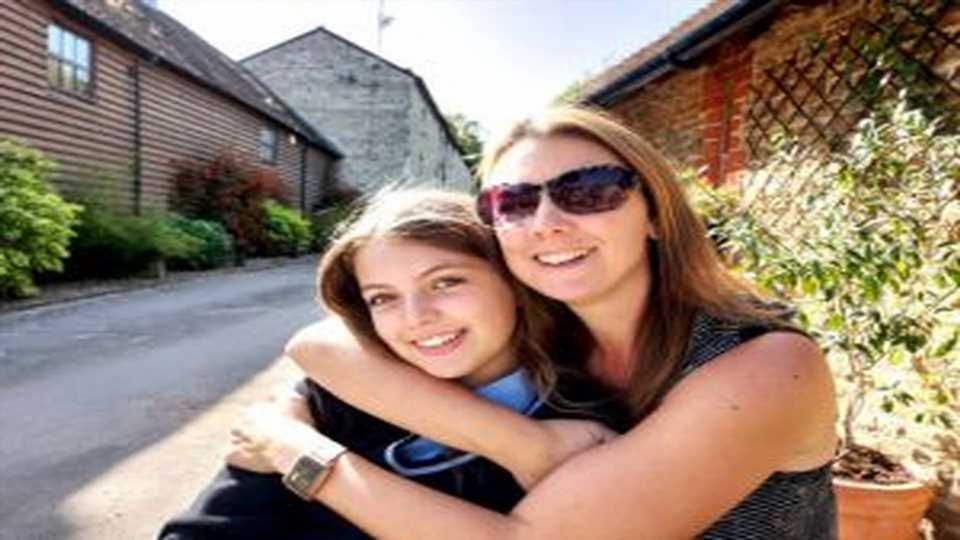
My 'cool, kind' little girl started slurring and fainted at school – just six months later she died | The Sun
November 1, 2023A TEENAGE girl died just six months after she began slurring her words at school.
Ellie Riccio, 14, started showing symptoms like slurred speech and falling over repeatedly in January 2022.
Her mum, Kim, 45, rushed her to hospital after she fainted in drama class – and scans showed a mass on her brain.
Further tests revealed Ellie, who studied at Ash Manor School in Surrey, had a deadly type of brainstem tumour, called diffuse intrinsic pontine glioma.
The school girl was just one of 30 children in Britain to be diagnosed with the rare condition.
Kim said: "The consultant referred to it as a 'heart sink' tumour because that's what their heart does every time they diagnose it, knowing it can't be fixed."
Read more on brain tumours

These are the signs and symptoms of a brain tumour you should be aware of

From blurry vision to forgetfulness – the signs of a brain tumour you must know
The mass had grown and wrapped around her brain stem, which limited her treatment options.
Ellie's family from Surrey were told she had 10 months to live – but in reality, she had just six.
The teen died in Shooting Stars Hospice in Guildford on June 28 2022.
"It's not fair – other families have had a year, sometimes even two, with their child," Kim said.
Most read in Health

Warning as outbreak of deadly Victorian disease declared as 7 children fall ill

Common antibiotics ‘no longer effective’ in children – fuelling surge in deaths

Millions at risk still haven’t had flu and Covid jabs – are you eligible?

Our son, 4, died hours after he was sent home… we were told ‘give him Calpol’
To finish the three weeks of radiotherapy treatment, Ellie and her family moved to London.
The mum said: "We celebrated New Year in London and watched the fireworks from the top floor of the hospital.
"I observed the joy in her face as she watched the spectacle in the sky for the first time. It was bittersweet as I knew it would be her last."
Before she died, Ellie lost her mobility, speech and ability to eat.
"It was horrible, and because of the meds, she didn't look the same anymore," the mum explained.
Despite her ordeal – Kim says her daughter kept her "cool, thoughtfulness and kindness" throughout.
She added: "Even on extremely high dose steroids, the 'roid rage' didn't kick in, and she kept her calm almost all of the time and stayed the kind and thoughtful girl.
"We managed a family holiday to Cornwall, which Ellie loved."
But Ellie very quickly lost her battle against the tumour and needed 24-hour care.
"My parents moved in with me to help care for her; we did this for five weeks. It was like having a baby again," Kim said.
Kim is now raising money for Brain Tumour Research by doing 100 reps of any exercise a day for all of November.
She added: "I'm doing this challenge for her and to keep her spirit alive in the hope that other families don't have to experience the heartbreak I have."
Mel Tiley, community development manager at Brain Tumour Research, said: "We're deeply saddened to hear about Ellie's death of a brain tumour.
Read More on The Sun

I live with 2 boyfriends & 6 cats – we don't share a bed, it's a love-filled home

I was chucked out of Premier Inn restaurant for breaking ‘ridiculous’ rule
"Her story is a stark reminder of the indiscriminate nature of this disease, which can affect anyone at any time.
"We're really grateful to Kim for supporting us in fundraising and campaigning to help us to raise awareness."
Signs to watch out for in your child
DIFFUSE intrinsic pontine glioma (DIPG) are one of the more common and aggressive brain tumours in kids.
They start in a part of the brain – the brainstem – called the pons.
It's deep inside the lower part of the brain, which is why they can be so deadly.
It's the part of the brain that's responsible for critcal bodily functions like breathing, sleeping and blood pressure.
Experts don't know the cause of DIPG, which can be hard for parents to accept.
Signs and symptoms include:
- abornmal alignment of the eyes, or double vision
- weakness of facial muscles, or facial asymmetry
- arm and leg weakness
- unstable balance and co-ordination
- difficulties walking and speaking
To find out more visit The Brain Tumour Charity.
Source: Read Full Article




